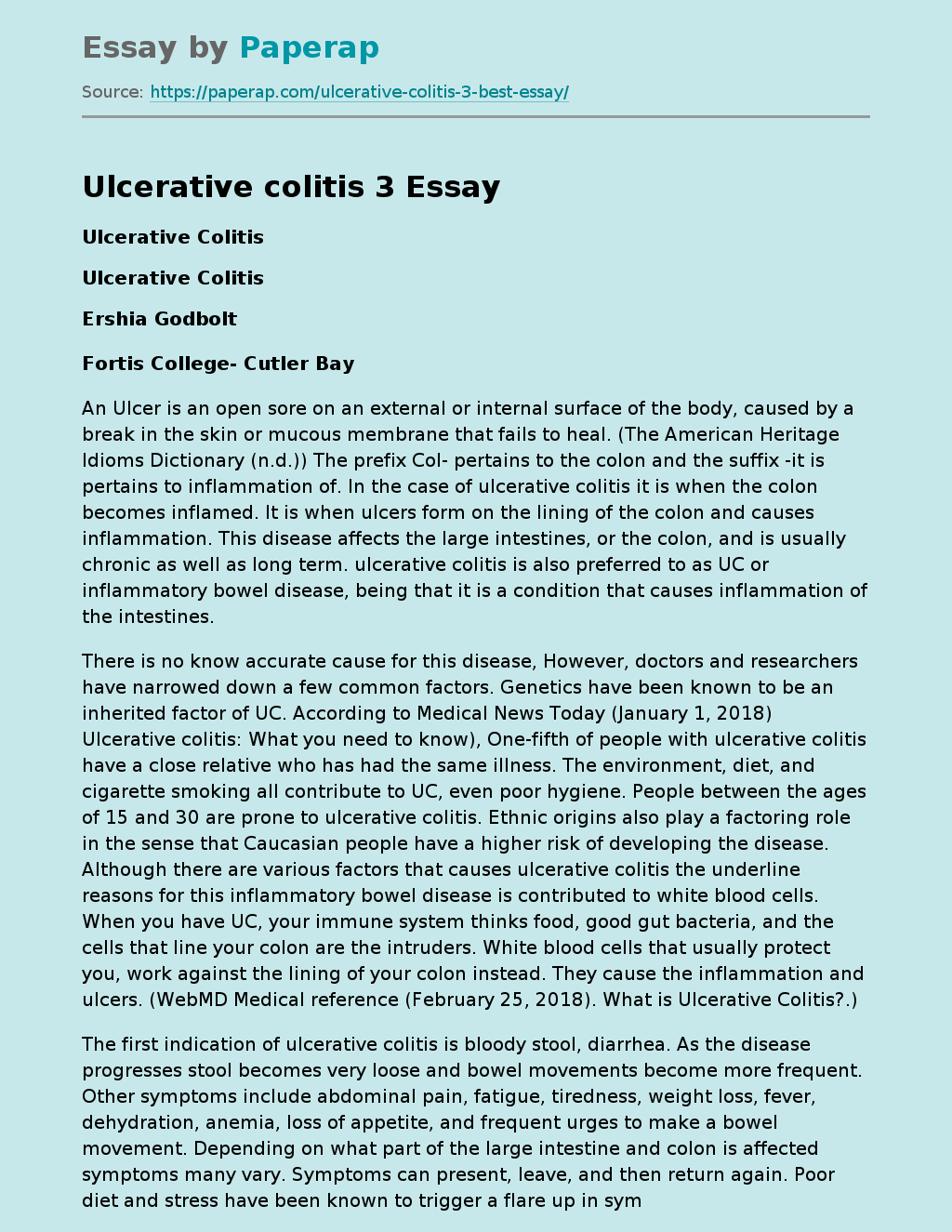Ulcerative Colitis
The following example essay on “Ulcerative Colitis” is about a chronic disease of the colonic mucosa that most often presents with excruciating bloody diarrhea.
An Ulcer is an open sore on an external or internal surface of the body, caused by a break in the skin or mucous membrane that fails to heal. (The American Heritage Idioms Dictionary (n.d.)) The prefix Col- pertains to the colon and the suffix -it is pertains to inflammation of. In the case of ulcerative colitis it is when the colon becomes inflamed.
It is when ulcers form on the lining of the colon and causes inflammation. This disease affects the large intestines, or the colon, and is usually chronic as well as long term. ulcerative colitis is also preferred to as UC or inflammatory bowel disease, being that it is a condition that causes inflammation of the intestines.
There is no know accurate cause for this disease, However, doctors and researchers have narrowed down a few common factors.
Genetics have been known to be an inherited factor of UC. According to Medical News Today (January 1, 2018) Ulcerative colitis: What you need to know), One-fifth of people with ulcerative colitis have a close relative who has had the same illness.
The environment, diet, and cigarette smoking all contribute to UC, even poor hygiene. People between the ages of 15 and 30 are prone to ulcerative colitis. Ethnic origins also play a factoring role in the sense that Caucasian people have a higher risk of developing the disease. Although there are various factors that causes ulcerative colitis the underline reasons for this inflammatory bowel disease is contributed to white blood cells.
When you have UC, your immune system thinks food, good gut bacteria, and the cells that line your colon are the intruders. White blood cells that usually protect you, work against the lining of your colon instead. They cause the inflammation and ulcers. (WebMD Medical reference (February 25, 2018). What is Ulcerative Colitis?.)
The first indication of ulcerative colitis is bloody stool, diarrhea. As the disease progresses stool becomes very loose and bowel movements become more frequent. Other symptoms include abdominal pain, fatigue, tiredness, weight loss, fever, dehydration, anemia, loss of appetite, and frequent urges to make a bowel movement. Depending on what part of the large intestine and colon is affected symptoms many vary. Symptoms can present, leave, and then return again. Poor diet and stress have been known to trigger a flare up in symptoms.
As in every medical diagnosis diet is always a key factor. Although food does not cause ulcerative colitis, some food choices can cause a flare up of symptoms of UC. In this case, a high-protein, high calorie diet is recommended. drinking plenty of fluids, mainly water is very essential. This prevents dehydration and aids in counter acting weight loss, which are common symptoms of ulcerative colitis. Caffeine and alcohol can increase dehydration, therefore it is recommended that they be eliminated from the diet. Eating smaller meals but frequently can help increase weight and prevent malnutrition. Vitamins and supplements can also be beneficial to lowering flare ups of ulcerative colitis.
Treatments for ulcerative colitis include aminosalicylates, which are specific medications that are given to treat and prevent flare up of UC. Mild to moderate cases of ulcerative colitis are also treated with antibiotics to fight infections. If aminosalicylates are not effective then corticosteroids may be given to reduce inflammation.
In the event that neither of these treatments work an immunosuppressant to lower the immune system is prescribed. For patents with sever ulcerative colitis biologics drugs are prescribed to bring about remission. Once in remission, normal treatment of aminosalicylates are given to prevent reoccurrences. In extreme cases, the patient is hospitalized to prevent dehydration and malnutrition. The doctor will then perform a colectomy which will remove the colon completely.
Ulcerative Colitis. (2019, Dec 04). Retrieved from https://paperap.com/ulcerative-colitis-3-best-essay/

